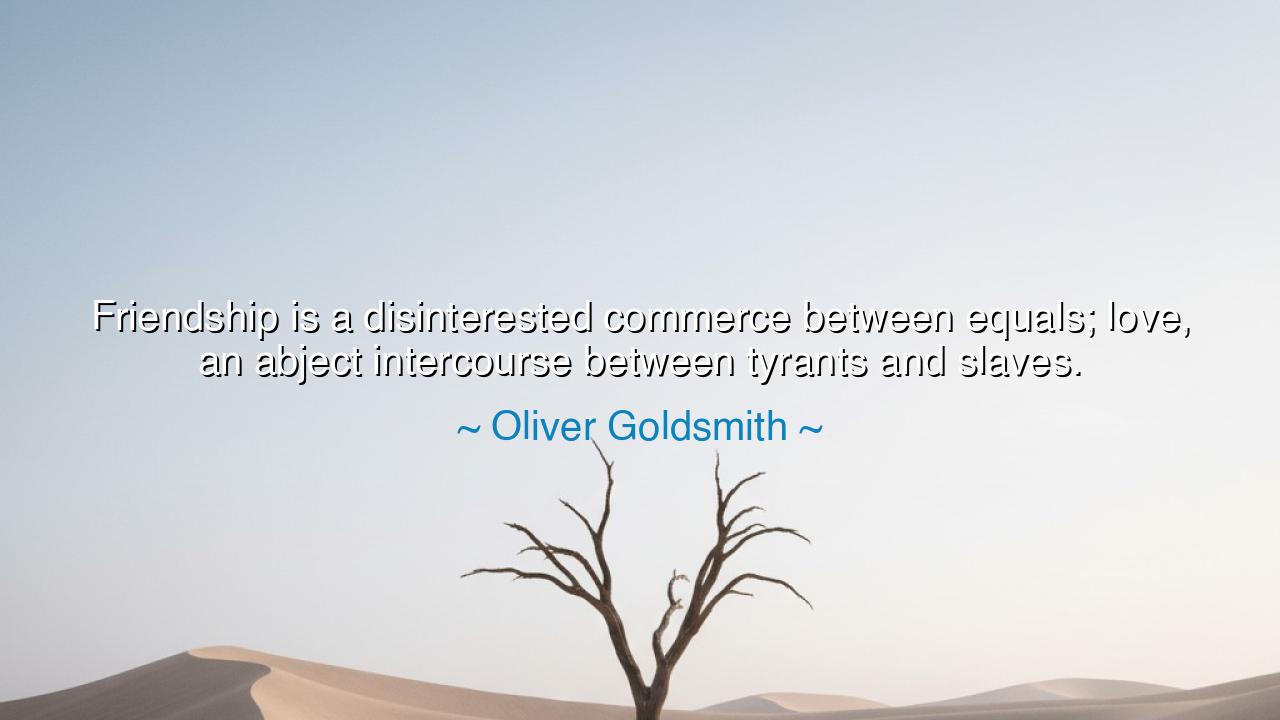
Friendship is a disinterested commerce between equals; love, an
Friendship is a disinterested commerce between equals; love, an abject intercourse between tyrants and slaves.






In the brilliant yet piercing words of Oliver Goldsmith, the poet and philosopher of the eighteenth century, we find an insight that reveals the delicate nature of the human heart: “Friendship is a disinterested commerce between equals; love, an abject intercourse between tyrants and slaves.” This saying, though clothed in irony, bears the mark of deep observation. It reminds us that friendship and love, though often intertwined, are two very different kingdoms of the soul. One is built upon equality and balance — a noble exchange between minds; the other, upon passion and surrender — a storm where power shifts and reason is lost. Goldsmith speaks here not to mock love, but to reveal its peril: that while friendship elevates, love can enslave.
The first part of his wisdom — that friendship is a disinterested commerce between equals — tells us that true friendship is born from purity of spirit. “Disinterested” does not mean indifferent; it means free from selfish motive. A real friend gives without seeking reward, offers counsel without envy, and stands beside you not for advantage but for affection. Such friendship is indeed a commerce, but of virtues — an exchange of trust, understanding, and goodwill, rather than gain or flattery. It is a bond of equals, where neither dominates nor submits, for both share the same respect and regard. In this way, friendship mirrors justice itself — balanced, harmonious, and enduring.
Yet when Goldsmith turns to love, his tone darkens: it becomes, he says, “an abject intercourse between tyrants and slaves.” What does he mean by this harsh imagery? He speaks of the passion that consumes reason, where one heart must always command and the other obey. In the realm of romantic love, equality so often vanishes. Desire becomes a battlefield, and affection turns to dependency. One lover rules in dominance, while the other, through fear or devotion, submits. Thus, love, though divine in promise, can become tyranny of the emotions, where liberty is surrendered and the soul is no longer free. Goldsmith warns that such love, unless tempered by friendship, can lead to ruin — for it is the nature of passion to exalt and destroy in the same breath.
The origin of Goldsmith’s reflection lies in both his life and his age. Living in the century of Enlightenment, he stood among thinkers who sought to understand the human condition through both reason and feeling. In his writings — especially in The Vicar of Wakefield and The Citizen of the World — Goldsmith observed with tenderness and irony how people are enslaved by their own hearts. His own life, marked by struggle and solitude, gave him cause to study friendship as a refuge and love as a danger. He had seen men rise by friendship’s loyalty and fall by passion’s folly. Thus, his quote is not cynicism, but wisdom born of both observation and pain.
History offers many examples of this truth. Consider the tale of Antony and Cleopatra — two rulers whose love burned like fire and ended in ashes. Their passion, though magnificent, was not a bond of equals. It was a dance of power and surrender, where love became obsession and loyalty to their kingdoms was lost. Their story is the very embodiment of Goldsmith’s warning — that love, ungoverned by reason, turns both lovers into captives, bound by desire. Yet contrast this with the friendship of Cicero and Atticus, who, across the storms of Roman politics, remained loyal and honest, each preserving the other’s dignity. Their friendship, founded on equality and mutual respect, endured far beyond the tempests of ambition.
There is, however, a deeper layer of compassion in Goldsmith’s contrast. He does not condemn love outright, for even in its madness there lies beauty and transcendence. Rather, he implores us to understand that friendship is the foundation upon which love must rest if it is to endure. When affection is mingled with respect, when passion is tempered by patience, when lovers treat one another as equals rather than masters and slaves — then love becomes not abject but divine. The tyrant and the slave transform into companions, and love, purified by friendship, becomes freedom rather than bondage.
Thus, the lesson to be drawn is clear and timeless: seek balance in affection. Cherish friendship as the soil in which all other forms of love must grow. Let neither pride nor submission rule the heart, for where equality ends, true intimacy dies. In your friendships, be generous but not dependent; in your loves, be passionate but not possessive. Remember that the truest relationships — whether of friend or lover — are those in which each soul stands upright, unbent, and unafraid.
So, dear listener, heed the wisdom of Oliver Goldsmith: friendship ennobles because it is born of freedom; love, unchecked, enslaves because it forgets equality. Let your heart be strong enough to love, yet wise enough to remain free. Build your relationships as the ancients built temples — on foundations of respect and balance. For only then will your friendships endure unbroken, and your loves, instead of consuming you, will illuminate your life like the steady flame of an eternal lamp.






AAdministratorAdministrator
Welcome, honored guests. Please leave a comment, we will respond soon